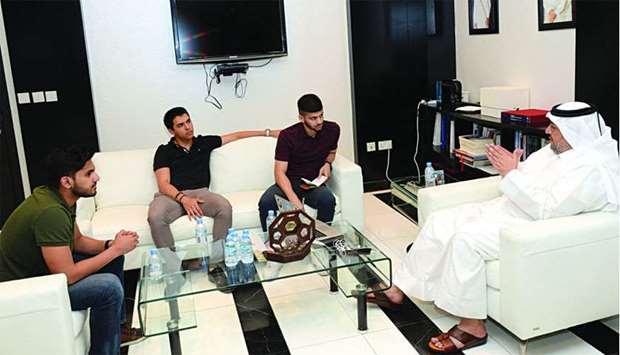Considering the fact that many of the road traffic accidents in the world are caused by distracted drivers, an idea developed as a startup pitch by a group of Carnegie Mellon University in Qatar (CMU-Q) graduates may prove to be a boon to enhance road safety.
The idea, which the team developed during a three-day competition, is an all-in-one, dashboard-mounted, heads-up display and mobile phone carriage to make sure drivers keep their eyes on the road. The system provides access to driving directions and advanced safety features like night vision and collision detection, without having drivers look at their mobile phones.
VisKit took first place at Quick Startup 2019, a contest for university students and new graduates to create a business plan and investor pitch over the course of a weekend.

The graduates with the Editor-in-Chief at the Gulf Times office. PICTURES: Thajudheen
VisKit was developed by a team comprising four graduating seniors from CMU-Q’s Business Administration Program: Ommar Aburaddad, Mohamed Hamdi, Faisal Mir and Haris Syed.
Three members of the team — Mir, Syed and Aburaddad — recently visited Gulf Times Editor-in-Chief Faisal Abdulhameed al-Mudahka at his office as part of their efforts to explore the prospects of their idea as a startup business venture.
VisKit upholds the motto: Empowering Ordinary Cars With the Future of Safety.
“The idea is to help Qatar reduce road accidents by putting a very proactive system in place. With several advanced features, VisKit’s technology will help Qatar improve the current situation by reducing road accidents," Mir told Gulf Times.
According to data available with the Ministry of Interior, Qatar records 800 road accidents a day on an average.
The CMU-Q students have found 51% of the total accidents are caused by motorists who use mobile phones while driving.
Qatar's government spends QR3.7bn towards reducing distraction on the roads by raising awareness and taking up other measures, they said.
VisKit enables safe driving by helping drivers concentrate on driving.
Its technology is affordable and a slew of factors makes it user friendly.
VisKit is fully customisable with both Android and iOS applications and it is easy to be installed in vehicles.
Its true vision camera helps drivers see what they miss during driving while the display lens ensures proper sighting.
These facilities mitigate the need to look around while driving and help drivers prevent collision.
Wireless charging is available with VisKit and it incentivises phone-free driving.
The students’ plan is to make the advanced technology available to every car and address the menace of distracted driving.
They see good scope for their product in the Qatar market and expect a revenue of QR 6.5mn if 13,000 units are sold in one year.
They are planning to approach taxi and insurance companies to explore its business potential.
The team members said the device could be sold for QR549 a piece and the price could be brought down further if bulk orders are given.
Al-Mudahka, who came up with valuable suggestions during the meeting, asked the students to approach authorities concerned with their innovative idea.
He agreed with them that distracted driving remained a concern and said VisKit could help Qatar address the situation.
Al-Mudahka also encouraged the young men by advising them to continue to take part in exhibitions and competitions held across the world and to present their innovative ideas at such venues.


